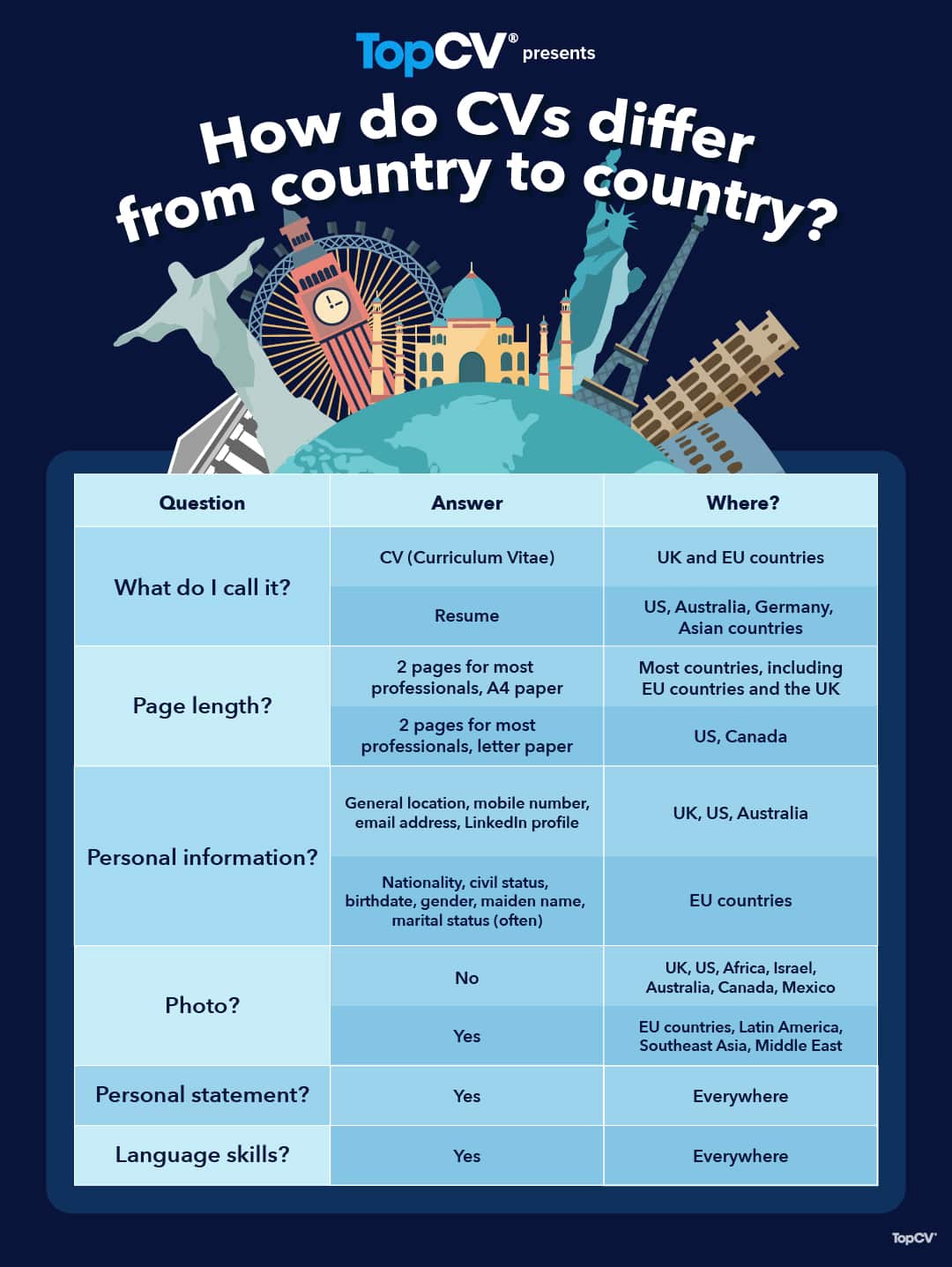How Do CVs Differ From Country To Country?

When it comes to CVs, there’s no universal template. Depending on the country in which you’re applying for jobs, there may be differing standards for what to include on your CV and what should be left out. If you’re looking to relocate to a different country, your CV may need to be rewritten. Here are the basics of what you need to look out for.
Around the globe, all CVs are not created equal.
Re-published with the agreement of TopCV
How do CVs differ from country to country?
- What do I call it?
The UK and most European countries refer to this job-application document as a ‘CV’, which is an abbreviation for the Latin term ‘curriculum vitae’, meaning ‘course of (one’s) life’. In contrast, you’ll typically find companies asking for a ‘resume’ in the U.S, Australia, Germany and Asian countries, including China, Singapore and Japan.
In the U.S, you may see the term ‘CV’ attached to an academic CV (also known as an academic resume), which is used in the worlds of science and academia. Academic CVs are typically much longer documents that offer a deep dive into a candidate’s education, employment, appointments and publications. They should not be confused with the British and European CV.
-
Page length
Length conventions tend not to vary by country – most CVs are typically kept at one or two pages. This generally breaks down to one page for entry-level positions and two pages for most professionals; three pages is uncommon and reserved for senior executives with extensive experience. The only exceptions are if you work in academia or a scientific field where you would use the aforementioned academic CV format, or if you are applying for a position within the U.S. federal government, which has specific requirements that often require more than three pages.
One minor thing to note, however, is that while page length conventions are not different, the page size is. In the U.S. and Canada, letter size is used, whereas the UK and most other countries use A4 paper.
-
Personal information
In the UK, U.S. and Australia, the personal information you include will generally be limited to your town and postal code (or city and state), phone number, email and the link to your LinkedIn profile. Employers see the incorporation of more specific details as a potential opportunity for HR managers to discriminate ‒ whether implicitly or explicitly ‒ between certain candidates.
But for EU countries, including personal details is often expected. These may include your age, nationality, birth date, maiden name and often marital status.
-
CV photo
You’ll generally find that including a photo on your CV is discouraged in the UK, Africa, Israel, India, Australia, Canada, Mexico and the U.S. Like some personal information, headshots can be seen as an opportunity for HR managers to discriminate between candidates. Actors and entertainers in these countries may include a separate photo with their CVs in these countries, but doing so outside of these professions is discouraged.
However, there are some countries where including a photograph on your CV is expected. These areas include:
- EU member countries
- Latin America (except Mexico)
- Southeast Asia (e.g. Singapore, Thailand, Vietnam, the Philippines)
- Middle East (particularly in the UAE)
If you’re applying to work in any of these countries, your image should be a passport-size colour photo of yourself in business attire on hand. You want a photo that is high resolution, preferably taken by a professional photographer ‒ selfies won’t make the cut. Select a recent photo and make sure it’s a clear headshot, as employers do not look favourably on group photos.
-
Personal statement
Most countries expect the inclusion of a personal statement on a CV. This is a short paragraph at the head of the first page that gives an employer a summary of your career accomplishments and objectives. It can take the form of a bulleted list or short paragraph, though most professional writers use the latter. Click here to learn more about writing a strong personal statement.
-
Language skills
Multilingual skills are valuable in any workplace, especially when applying for jobs in countries that have multiple official languages. Therefore, it’s crucial to include your language abilities on your CV if you have them.
In addin
Understanding the CV conventions in the country in which you’re applying for jobs is imperative. Without the proper knowledge, you may find yourself including (or excluding) essential information that HR managers are looking for.
Rather than doing all the research yourself, it’s worth going right to a professional who knows the international ropes. They will have all the information needed to craft the perfect CV for the country of your choosing. Learn more here.

